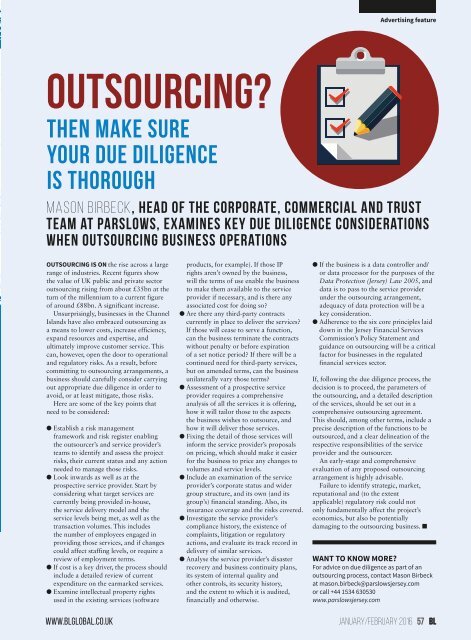BL Magazine
Create successful ePaper yourself
Turn your PDF publications into a flip-book with our unique Google optimized e-Paper software.
Advertising feature<br />
Outsourcing?<br />
Then make sure<br />
your due diligence<br />
is thorough<br />
Mason Birbeck, Head of the Corporate, Commercial and Trust<br />
team at Parslows, examines key due diligence considerations<br />
when outsourcing business operations<br />
OUTSOURCING IS ON the rise across a large<br />
range of industries. Recent figures show<br />
the value of UK public and private sector<br />
outsourcing rising from about £35bn at the<br />
turn of the millennium to a current figure<br />
of around £88bn. A significant increase.<br />
Unsurprisingly, businesses in the Channel<br />
Islands have also embraced outsourcing as<br />
a means to lower costs, increase efficiency,<br />
expand resources and expertise, and<br />
ultimately improve customer service. This<br />
can, however, open the door to operational<br />
and regulatory risks. As a result, before<br />
committing to outsourcing arrangements, a<br />
business should carefully consider carrying<br />
out appropriate due diligence in order to<br />
avoid, or at least mitigate, those risks.<br />
Here are some of the key points that<br />
need to be considered:<br />
● Establish a risk management<br />
framework and risk register enabling<br />
the outsourcer’s and service provider’s<br />
teams to identify and assess the project<br />
risks, their current status and any action<br />
needed to manage those risks.<br />
● Look inwards as well as at the<br />
prospective service provider. Start by<br />
considering what target services are<br />
currently being provided in-house,<br />
the service delivery model and the<br />
service levels being met, as well as the<br />
transaction volumes. This includes<br />
the number of employees engaged in<br />
providing those services, and if changes<br />
could affect staffing levels, or require a<br />
review of employment terms.<br />
● If cost is a key driver, the process should<br />
include a detailed review of current<br />
expenditure on the earmarked services.<br />
● Examine intellectual property rights<br />
used in the existing services (software<br />
products, for example). If those IP<br />
rights aren’t owned by the business,<br />
will the terms of use enable the business<br />
to make them available to the service<br />
provider if necessary, and is there any<br />
associated cost for doing so?<br />
● Are there any third-party contracts<br />
currently in place to deliver the services?<br />
If those will cease to serve a function,<br />
can the business terminate the contracts<br />
without penalty or before expiration<br />
of a set notice period? If there will be a<br />
continued need for third-party services,<br />
but on amended terms, can the business<br />
unilaterally vary those terms?<br />
● Assessment of a prospective service<br />
provider requires a comprehensive<br />
analysis of all the services it is offering,<br />
how it will tailor those to the aspects<br />
the business wishes to outsource, and<br />
how it will deliver those services.<br />
● Fixing the detail of those services will<br />
inform the service provider’s proposals<br />
on pricing, which should make it easier<br />
for the business to price any changes to<br />
volumes and service levels.<br />
● Include an examination of the service<br />
provider’s corporate status and wider<br />
group structure, and its own (and its<br />
group’s) financial standing. Also, its<br />
insurance coverage and the risks covered.<br />
● Investigate the service provider’s<br />
compliance history, the existence of<br />
complaints, litigation or regulatory<br />
actions, and evaluate its track record in<br />
delivery of similar services.<br />
● Analyse the service provider’s disaster<br />
recovery and business continuity plans,<br />
its system of internal quality and<br />
other controls, its security history,<br />
and the extent to which it is audited,<br />
financially and otherwise.<br />
● If the business is a data controller and/<br />
or data processor for the purposes of the<br />
Data Protection (Jersey) Law 2005, and<br />
data is to pass to the service provider<br />
under the outsourcing arrangement,<br />
adequacy of data protection will be a<br />
key consideration.<br />
● Adherence to the six core principles laid<br />
down in the Jersey Financial Services<br />
Commission’s Policy Statement and<br />
guidance on outsourcing will be a critical<br />
factor for businesses in the regulated<br />
financial services sector.<br />
If, following the due diligence process, the<br />
decision is to proceed, the parameters of<br />
the outsourcing, and a detailed description<br />
of the services, should be set out in a<br />
comprehensive outsourcing agreement.<br />
This should, among other terms, include a<br />
precise description of the functions to be<br />
outsourced, and a clear delineation of the<br />
respective responsibilities of the service<br />
provider and the outsourcer.<br />
An early-stage and comprehensive<br />
evaluation of any proposed outsourcing<br />
arrangement is highly advisable.<br />
Failure to identify strategic, market,<br />
reputational and (to the extent<br />
applicable) regulatory risk could not<br />
only fundamentally affect the project’s<br />
economics, but also be potentially<br />
damaging to the outsourcing business. n<br />
WANT TO KNOW MORE?<br />
For advice on due diligence as part of an<br />
outsourcing process, contact Mason Birbeck<br />
at mason.birbeck@parslowsjersey.com<br />
or call +44 1534 630530<br />
www.parslowsjersey.com<br />
www.blglobal.co.uk january/february 2016 57

















